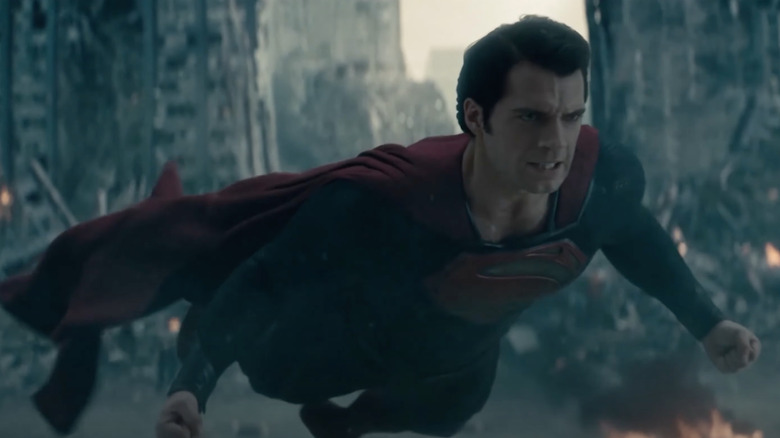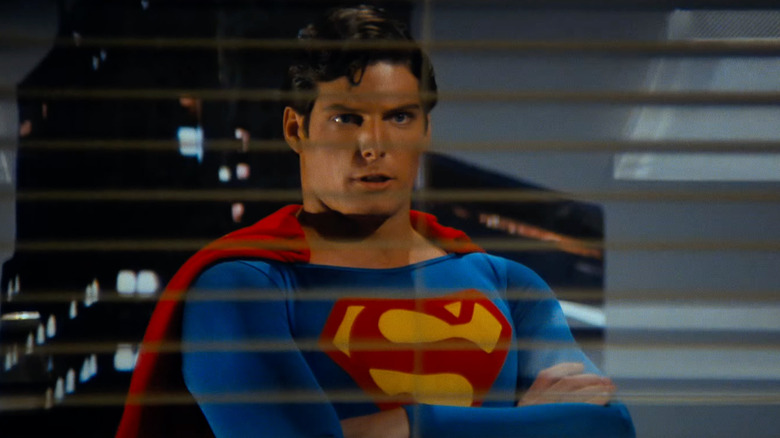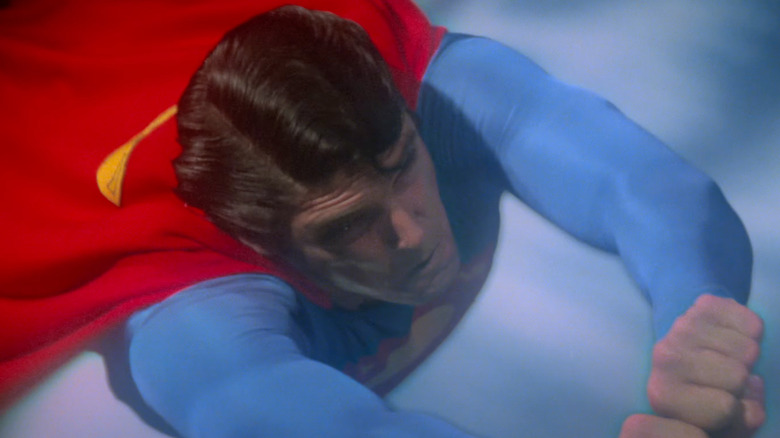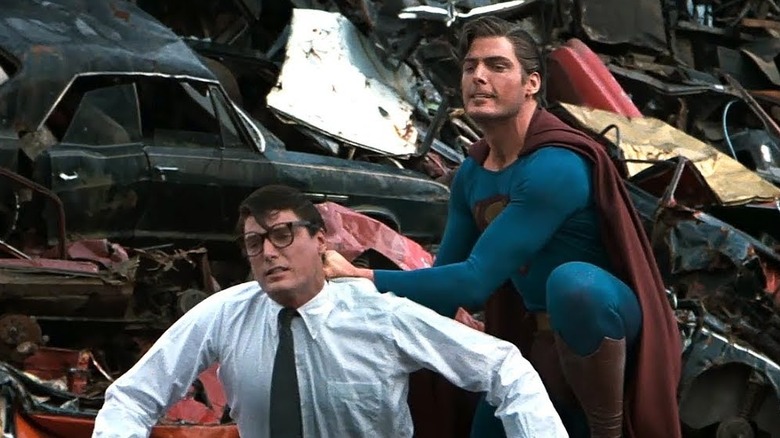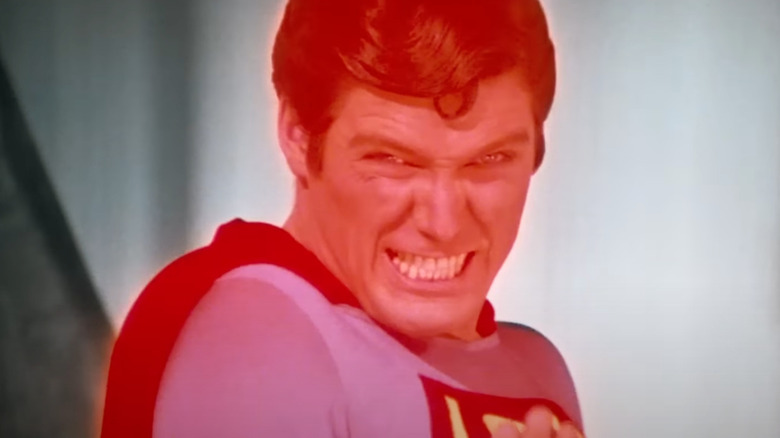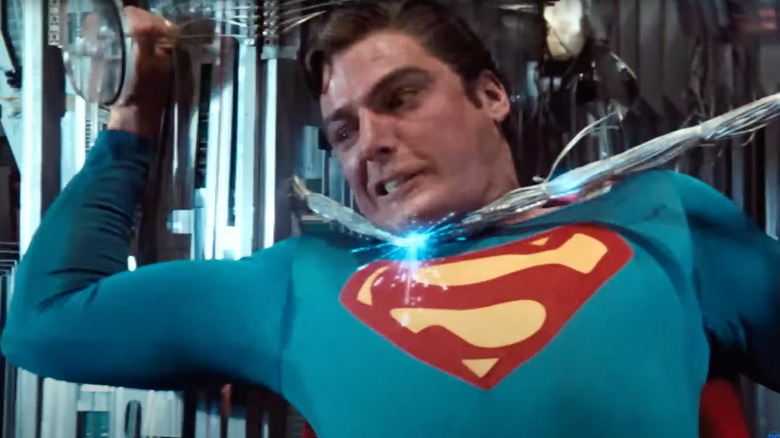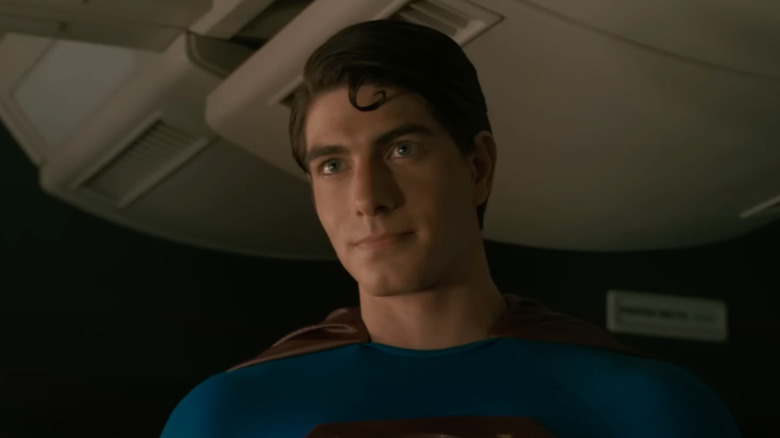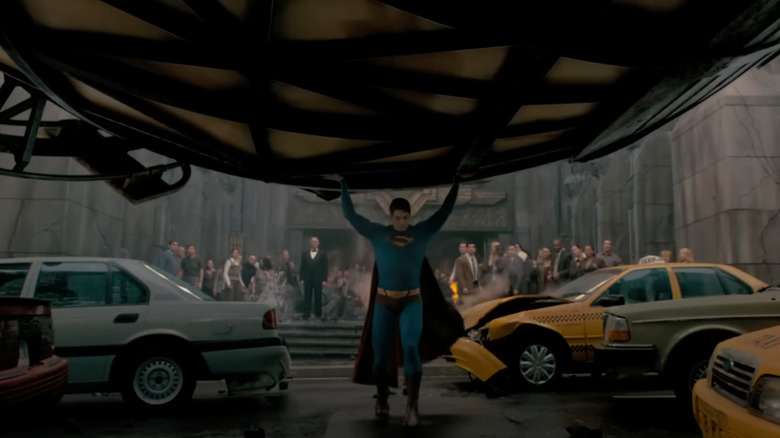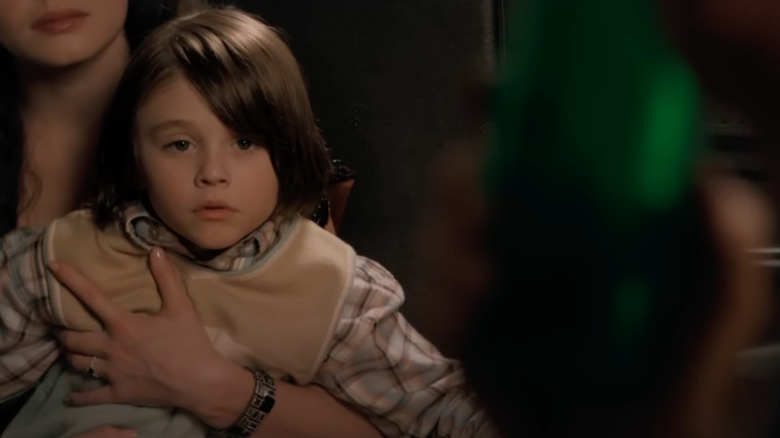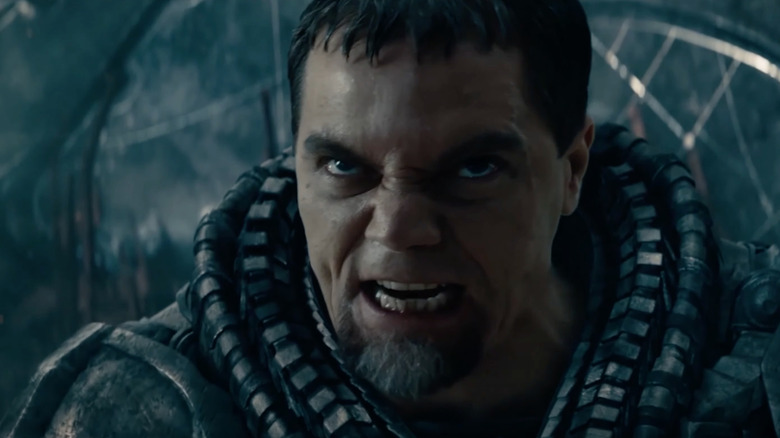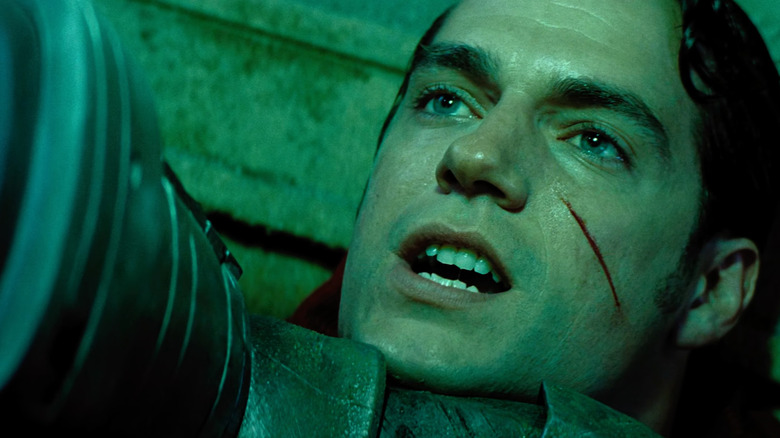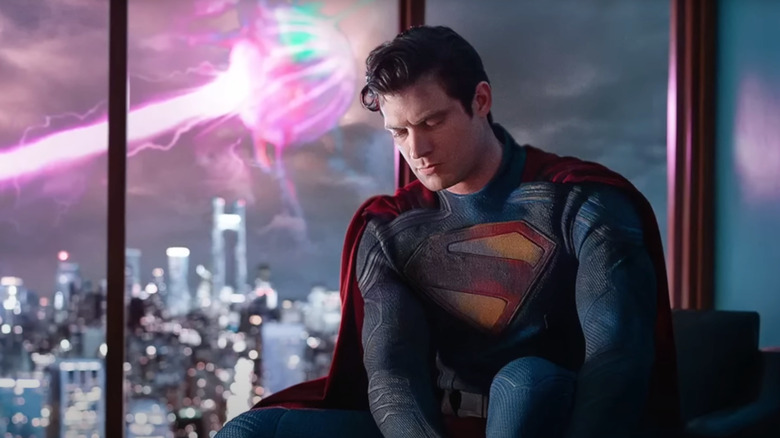Superman Movie Fan Theories That Actually Make Sense
Since 1938, Superman has dominated countless comic books, inspired a legion of fans, and appeared on the big and small screen to varying degrees of success. Adorned in blue tights and a red cape, the Man of Steel is a traditional hero in every sense of the word: morally sound, full of hope, and never too busy for any task, great or small. He's a Boy Scout who stands for truth, justice, and the American Way, an ideology that contrasts sharply against today's darker generation of heroes like Batman and Spider-Man.
But that hasn't stopped producers from trying their hand at blockbuster success with the big guy. Richard Donner's "Superman: The Movie," the grandfather of all superhero films, remains the most successful entry, critically and commercially (at least when adjusted for inflation, per The Numbers), while Bryan Singer's "Superman Returns" and Zack Snyder's "Man of Steel" trilogy divided critics and audiences alike. Soon, James Gunn steps to the plate with "Superman Legacy," in the hopes of establishing a brand new DC universe.
Naturally, fans are busily speculating about the new film based on limited information. While perusing the Reddit boards and social media in search of said conversations, I stumbled on a whole slew of Superman theories based on the previous films. Surprisingly, a fair amount of them make a lot of sense and, in some cases, enhance their pictures. Here are the most noteworthy entries I discovered, including one for "Superman Legacy." Up, up and away!
Superman: The Movie takes place in 1978
I've seen "Superman: The Movie" at least a thousand times. I watched it often as a kid and spent many afternoons adorned in a blue shirt and red towel, reenacting my favorite scenes. Yet, I've never once questioned what year the story takes place. I always assumed it occurred in the 1970s but never bothered to pinpoint the exact time of events.
Thankfully, a few die hard fans took to a discussion forum to debate this particular topic. According to a user named LogicDictates, "Superman" takes place in 1978. That makes sense considering Richard Donner's beloved superhero classic was released that year, but LogicDictates believes there are additional clues throughout the franchise that confirm this theory.
First, we are told that Clark was 18 when he went north to find his true heritage. He creates the Fortress of Solitude, meets his real father, Jor-El (Marlon Brando) and spends the next 12 years learning about the universe — a detail confirmed by Jor-El. Later, when Lex Luthor (Gene Hackman), Otis (Ned Beatty), and Miss Teschmacher (Valerie Perrine) read an article written by Lois Lane (Margot Kidder), we learn that Krypton exploded in 1948, 30 years prior to Clark Kent's appearance at the Daily Planet. So, it tracks and even matches the film's Messiah allegory, as Jesus Christ was 30 when he started his ministry.
Superman traveled through time
Sticking with the concept of time, a cool theory by Reddit user Cilarnen (since deleted) believes that Superman didn't turn back time at the tail end of "Superman: The Movie." Rather, our boy in blue traveled through time to stop Lex Luthor from destroying California. The theory notes that Superman flew around the world faster than the speed of light, fast enough to travel backward through time. Visually, director Richard Donner captures this idea up by showing Luthor's destruction in reverse. Superman rewinds the movie to get a second shot at stopping his arch nemesis.
Tellingly, I think this makes a lot of sense. "Superman: The Movie" is a fantasy. Yet, up until the ending, Donner had done a remarkable job establishing a realistic world with rules and limitations around the iconic hero. Then, suddenly, in the big finale, logic goes out the window and Superman reverses the Earth's rotation; an event that would likely cause the death of everyone on the planet. Time travel makes a little more sense, even if it still strains logic.
So why do we see Superman return Earth back to its original orbit? Cilarnen explains this is merely an illusion. Superman is moving at an accelerated rate through time, searching for the perfect re-entry point before Lois' death. Our eyes cannot comprehend his speed, so the visuals are designed to help us understand his actions.
Two Supermen exist
Another unique "Superman: The Movie" theory directly tied to the above time-travel idea posits that two Supermen existed at the end of Donner's original film. Remember, the terrifying events wrought by Lex Luthor only occur because our caped hero doesn't have enough time to stop both nuclear missiles from detonating. Superman manages to perform many super-heroic acts but misses the chance to save Lois Lane from certain death. Hence, the need to travel back in time to remedy the situation.
Except, as noted by Fherchoz, when Superman travels back in time, he stumbles into his younger self. Together, these two super men are able to successfully prevent both missiles from hitting their targets, saving Lois and stopping Luthor's maniacal real estate plot. The catch is that older Superman must now live in the new timeline. Original Superman's sacrifice allows Lois to live happily ever after with a version of himself but ultimately renders himself obsolete. Eventually, he grows angry and, according to ComplexPractical3292, winds up fighting and losing to the New Superman during the junkyard scene in "Superman III." "And the 'past' killed the 'future,'" the user states.
Taking the concept in a different direction, another commenter notes that Original Superman tried to rectify his situation with more time travel and wound up resetting his own timeline resulting in "Superman Returns." Mind blown?
The Sunstone Crystal gives Superman unique abilities in Superman II
I love "Superman II" and continue to hold it in high regard despite its dated special effects and campy tone. Most fans likely know about the behind-the-scenes woes that plagued the production. Director Richard Donner shot much of "Superman II" concurrently with "Superman: The Movie," but he left the sequel after butting heads with producers Alexander & Ilya Salkind, who replaced him with Richard Lester.
To receive credit on the picture, Lester reshot a majority of footage and added more slapstick comedy beats and curious plot points that clash with Donner's grounded style. Specifically, during the climax at the Fortress of Solitude, Superman suddenly develops strange, new abilities. He magically conjures a giant "S" from his chest, teleports, and projects multiple versions of himself. These powers are never explained, leaving fans to debate whether they are creative additions or silly gimmicks.
Reddit user Supes1016 took the time to explain Superman's newfound abilities, theorizing that they stemmed from the green Sunstone Crystal the Man of Steel used to regain his powers. Jor-El's consciousness lives inside the crystal, and he may have purposefully withheld these special tools from his son until the time was right. This theory might also explain the magic kiss Superman uses to wipe Lois' memory in the finale.
Brainiac was in control in Superman II
Following the success of "Superman: The Movie," Richard Donner went to work finishing "Superman II," most of which he filmed while shooting the original film. As mentioned above, Donner was replaced by Richard Lester after disagreements with the producers, resulting in a sillier, albeit still effective, sequel.
Lester returned for "Superman III" and the British auteur crafted a largely comedic followup focused on the Man of Steel's battle against a wealthy industrialist (Robert Vaughn) and a goofy computer genius named Gus Gorman (Richard Pryor). Largely panned by critics and audiences, "Superman III" marks an enormous step down from the first two films in terms of quality, despite the sensational Evil Superman vs. Superman junkyard dustup.
Nevertheless, some fans argue the picture contains more depth than meets the eye. Reddit user Necronamakahn suggests that the villain Brainiac operated behind-the-scenes and aided Gus' superhuman computer abilities. "My theory is that Brainiac was in orbit and responsible for said events," Necronamakahn writes. "Gaining access to the computer Gus was using and, through subliminal messaging and suggestion, gave him the knowledge on how to hack computers as well as the schematics to the super computer they later built."
I like the theory. Unfortunately, as others point out in the comments, Necronamakahn likely put more thought into the story than Lester or his writers. However, it should be noted that Donner's plan for "Superman III" initially included Brainiac, according to the 13th Dimension (per ScienceFiction.com).
Superman Returns takes place in an alternate universe
Bryan Singer's reboot/sequel "Superman Returns" released in 2006 and ignores "Superman III" and "Superman IV," serving as a direct continuation of "Superman: The Movie" and "Superman II," specifically the legendary Donner Cut pieced together by editor Michael Thau. However, where the first two chapters occur in the late 70s, "Superman Returns" obviously takes place in the modern age.
What gives? Is "Superman Returns" a continuation of the Donner storyline or not?
According to Reddit user crisnakawara, the answer is that Singer's picture does indeed follow the events of "Superman" and "Superman II," except in an alternate dimension. "My theory is that 'Superman Returns' is a different universe than the first two Christopher Reeve movies, but where the same events happen, obviously, in different times, it's like an inspiration," the fan explained. In other words, you can watch all three movies back-to-back-to-back and get the gist of the overarching story, even though we are witnessing different iterations of similar occurrences.
Commenters on the post dub "Superman Returns" a "spiritual sequel," and note that other properties, like James Gunn's upcoming "Peacemaker: Season 2," follow this formula. That doesn't make Singer's production any less confounding. Still, if you're willing to look over the continuation gaffs, "Superman Returns" does sort of work as the third (and likely final) entry to the Donner-verse.
Bryan Singer was planning to explore a Dark Superman
Reddit user zakiszaz suggests another cool theory that gives "Superman Returns" more credence than it probably deserves. He believes that Singer was setting up a "Dark Superman" trilogy that would have culminated in our blue boy scout turning evil in the vein of "Injustice: Gods Among Us" and "The Dark Knight Returns" comic book series. He argues that Singer's film contains a "creepy underbelly," pointing out odd character beats that show a mopey Superman (Brandon Routh) spying on Lois Lane (Kate Bosworth). "Superman feels the need to leave Earth," zakiszaz says. "He has no problem with Earth lacking a protector."
Indeed, the film spends a good deal of time showing us that no one cares much about his alter ego, Clark Kent, either. Everyone, including Lois, dismisses him as little more than a bother. As Superman, his first interaction with Lois draws mixed emotions, and our mighty hero responds by acting "like a sulky teenager when he can't have what he wants." Zakiszaz believes that the sequel would have explored Superman's devolution from mankind's protector to a Homelander-like overlord, likely adding to the list of terrible things he's done throughout his lifetime.
Unfortunately, Singer's followup was cancelled in favor of Zack Snyder's DCEU, during which he ironically planned to make the Man of Steel a central villain working alongside Darkseid, albeit via mind control.
Lois spiked Jason's inhaler with Kryptonite
I tend to defend "Superman Returns" from critics, but I admit it's an incredibly weird movie. The gist is that Superman leaves Earth for several years to search for Krypton's remains and then returns to find that everyone, including Lois Lane, has moved on. Even worse, she has a kid, who, we later find out, is Superman's. However, Lois tells everyone that Richard White (James Marsden), her boyfriend, is the father, a lie that makes a certain amount of sense given that she wants to protect her child from potential enemies.
Ignoring the continuation errors this plot point raises in regard to the ending of "Superman II," let's assume Lois knew all along that Jason (Tristan Lake Leabu) is Superman's child. Naturally, she would go out of her way to hide his true identity, thus giving credibility to a theory by a Comic Book Resources member named SuperWho, who believes Lois administered kryptonite by way of inhaler to suppress Jason's powers. He points out a specific moment near the end where Jason, a feeble child with numerous medical issues, including asthma, suddenly demonstrates super strength by tossing a piano at a bad guy. After the incident, he stares at and eventually drops his inhaler.
Coincidence, or a hint at a larger conspiracy to hide Lois' secret? You be the judge.
Zod wanted to die
"Man of Steel" serves as the port of entry for Zack Snyder's under-appreciated "Snyderverse" and presents a darker, and per our original review, more action-packed iteration of Superman, here presented as a loner deciding whether or not to align with the human race to stop General Zod (Michael Shannon). Long story short, Superman (Henry Cavill) chooses Earth, but his decision comes with a cost.
During the climax, Superman squares off with Zod and, following a bitter scuffle, snaps his neck to prevent more destruction. According to Reddit user thundermatters, the controversial moment contains more depth than initially thought. He believes Zod wanted to die a soldier's death and used Superman as the gun to deliver the killing blow. Hence the reason he doesn't immediately murder the family with his heat vision, choosing instead to slowly push the beams toward them until Superman has no choice but to carry out the execution.
Essentially, both warriors knew the battle needed to end and made decisions to ensure it ended on their own terms. "So Zod let Superman kill him, but that act allowed Superman to remain the hero," noted nmvzciehjfal in the comments. Moreover, Superman's decision plays into his ultimate dilemma — is he a farm boy from Kansas or a god-like deity? "Him snapping Zod's neck is Superman allowing himself to be human," explains another user. "We're not perfect, we have weaknesses and emotions, and he's okay with that."
Superman manipulated Batman with Martha
Snyder continued his DCEU with the even more controversial "Batman v. Superman: Dawn of Justice," pitting our two heroes against each other for complicated (and confusing) reasons. Their intense fight ends when Superman tells Batman (Ben Affleck) to find and save his mother, "Martha," a scene that left many viewers scratching their heads, even as Zack Snyder defended it. Until now, Batman had dedicated much time and energy to taking Superman down, perceiving him as a global threat that must be stopped. Suddenly, Superman mentions his mother's name, which happens to be the name of Bruce Wayne's mom as well, and Bats immediately calls it quits.
Several Snyder fans have written lengthy articles discussing the psychological implications of this moment for both heroes. Reddit user darkpassenger9, however, has a much simpler explanation: Superman manipulated Batman. "Superman KNEW Bruce Wayne's mother, Martha, was murdered before his eyes, leading him down the path to becoming Batman," darkpassenger9 writes. "It's public knowledge. This means that Superman also knows that Batman's mother had the same name as his adoptive mother, Martha Kent."
It's an interesting theory that paints the scene in a completely different light. Superman and Batman's conflict doesn't come to a head out of sheer coincidence but rather knowledge gained by Clark Kent's investigative reporting. Snyder could have done a better job conveying this early in the picture, but maybe he trusted viewers to put two-and-two together.
Superman lives in a world of established heroes
Warner Bros. canceled the Snyderverse after numerous failed attempts to reconfigure the series on the fly, paving the way for James Gunn's "Superman Legacy," itself the jumping-off point for an all-new shared universe. Not much is known about the plot of the Man of Steel's latest chapter, but that hasn't stopped fans from offering their ideas.
Notably, a Twitter user by the name of @MrRadastic believes that "Superman Legacy" will see a world densely populated by superheroes. Superman enters the foray and must figure out how to leave a mark on this strange, new Earth. The twist is that all the heroes running rampant across the globe are a*******. Not villains, mind you, just jerks. Superman's efforts to lead the other heroes ultimately prevents him from saving his father, Jonathan Kent.
@MrRadastic believes the film will then follow the "Kingdom Come" storyline, which Gunn has already cited as a source of inspiration, that saw Superman retire due to apathy. A global threat beckons him back to action, and he lays down the law, showing his fellow super powered beings what it means to be a real hero. The meta connection, notes @MrRadastic, is that moviegoers have grown tired of traditional heroes and need a reminder of what it means to be a true leader.
This theory may also explain why the film's first official photo portrayed Superman seemingly wearily slipping into his famous costume.
